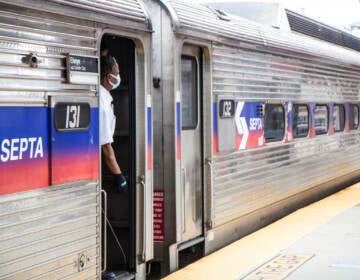Exclusive: TWU’s Willie Brown tees off on SEPTA

Willie Brown is not an easy man to pin down, but when PlanPhilly did sit down with him last week it was evident that he doesn’t have many nice things to say about SEPTA management.
The president of SEPTA’s largest union calls Joe Casey, the authority’s general manager, “a bean counter” who doesn’t really understand the agency he’s tasked with running.
Brown says Luther Diggs, assistant general manager of operations, is really in charge of SEPTA and is running it like a “military man,” fostering an abusive working environment.
This alleged dynamic, Brown said, is negatively impacting SEPTA’s labor relations and its bottom line, in the form of substantial arbitration losses over union grievances that total about $500,000 from the beginning of 2008 to the first few months of this year. That amount includes arbitration fees and back pay of Transport Workers Union Local 234 members who arbitrators ruled SEPTA improperly fired. As a result, union attorney Bruce Bodner says, SEPTA is trying to remove the entire arbitration panel.
Brown, who represents SEPTA’s largest union (at 5,100 employees), and Bodner sat down for a wide-ranging discussion on labor relations in the wake of comments Casey made to a SEPTA citizen advisory group in May.
During a question and answer session with the group, Casey said he wanted “different union leadership” to emerge from elections in September, who would be more amenable to working cooperatively with SEPTA management.
Casey backed away from those comments the next day, saying the authority’s relationship with Local 234 “continues to be very cooperative.”
But Brown paints a starkly different picture, one that is more in line with Casey’s off-the-cuff remarks.
“It’s not a working relationship,” Brown says, adding that “I don’t talk to Mr. Casey.” Brown said he hasn’t met with Casey since December 17, 2008, when SEPTA and the local exchanged formal demands to kick off negotiations for the current labor contract.
He also says SEPTA’s labor relations office, the arm of SEPTA the local regularly deals with, doesn’t “know their role.”
Instead of mediating disputes between the union and SEPTA management, Brown says labor relations offiice always takes the side of SEPTA managers — even when the evidence supports the union position.
For its part, SEPTA declined to respond to the substance of the local’s charges.
In a statement, Frances Keating, SEPTA’s chief labor relations officer, called Brown’s comments “political” and said it would be inappropriate for SEPTA to comment because Brown is “facing a serious re-election challenge within his own membership.” She added that after the Sept. 24 election she would be “pleased to discuss any of these issues” with Brown or his successor.
Bodner shot back in an e-mailed statement that Keating was offering “uninformed opinions about the election to avoid addressing the union’s critique of SEPTA’s Neanderthal labor policies and practices.”
He added that Keating is responsible for many of the problems the union identified and said she “obviously doesn’t want to engage in a serious discussion of the issues.”
Relations going south?
Brown and Bodner says labor relations at SEPTA soured after Lou Gambaccini was, in their words, pushed out as general manager in the mid-1990s.
“The word ‘joint’” was used a lot during his tenure, Brown explains, adding that Gambaccini fostered an era of labor peace and cooperation.
The union reps said Gambaccini set up committees represented by both sides to look into areas of cooperation between the union and management.
The committees were chaired by the Philadelphia Area Labor-Management Committee — a non-profit organization founded by the Greater Philadelphia Chamber of Commerce and the Philadelphia Council of the AFL-CIO — and included representatives of both SEPTA and the union.
Agreements created through these committees formed the basis of labor contracts signed in 1989, 1992 and 1995, Bodner says.
(Now, except for the joint safety committee, those committees — including joint productivity committees — no longer meet, he says.)
Gambaccini couldn’t be reached for comment.
The first indication that relations would change was during negotiations of the 1995 contract, Bodner says, when the SEPTA Board started to push for union concessions on work rules. Things came to a head during negotiations for the 1998 contract, when the TWU went on strike for 40 days.
1998 redux
While the strike eventually ended, the conflicts over union work rules that formed the basis for the showdown live on in battles between SEPTA and the TWU today, Bodner says, citing picking rights as an example.
Picking rights, or the right of union members to select the vehicles they work on and the shifts they work, was won by vehicle maintenance workers in the 1995 contract.
But because both sides think the 1998 contract tipped the balance of power in their favor, the two sides have been arguing over the extent of picking rights since that contract was signed, Bodner says.
Brown accuses SEPTA management of trying to take picking rights away from maintenance workers with the goal to be able to dole specialized work as a reward to favored workers.
These arguments, coupled with alleged improper working conditions, appear to be the crux of Local 234’s problems with SEPTA management today.
Brown points to a grievance the union recently filed concerning a foreman at Frankford Depot.
He says the foreman has tried to unilaterally change work rules for so-called vehicle readiness coordinators, or VRCs, and force them to be certified to drive SEPTA vehicles.
The problem, Brown says, is that VRCs, who manage maintenance procedures for vehicles, are assigned their jobs because they’re on medical disability. And he says he’s afraid that it’s unsafe for both the VRCs and others in the depot for them to be driving buses without medical clearance.
But instead of forcing the foreman to back down, Brown says, SEPTA’s labor relations office supported him, causing the union to file a grievance.
(The union’s complaints came after an unsuccessful lawsuit in federal court to stop a new drug testing policy SEPTA imposed on the VRCs.)
Brown further criticized SEPTA’s approach to safety in handling a widely publicized incident in which a rider died on an El Night Owl bus in April. Because the rider was “frothing” at the mouth, SEPTA should have pulled the bus out of service and sent police to it — especially given the fact that the bus driver was a woman and could have been in danger if the rider had turned violent, he said.
“You never sacrifice safety for schedule,” Brown says. He also shot back at comments Casey made suggesting bus driver Nikita Manfra’s incident report was crafted by the TWU. “She wrote the statement,” he says, adding that Casey was insulting the intelligence of SEPTA bus drivers by his comments.
Customer service critic
Brown is also critical of SEPTA’s recent customer service initiatives.
“They don’t really understand what the customer wants,” he says, calling SEPTA’s new requirement that front-line personnel wear name tags “a joke.”
Riders don’t care what the name of a cashier or trolley driver is, they want to get where they’re going on time, Brown says.
And management sabotages that goal, he says, pointing to bus and trolley schedules he calls “impossible” to meet.
He questions recent SEPTA initiatives, such as the installation of a new collision-avoidance system in the subway-surface trolley tunnel that wasn’t designed to handle the volume of trolleys it manages.
The system has been plagued with problems since it opened and has slowed travel to and from Center City considerably, Brown says. For example, trolleys operated on a 20 miles per hour speed restriction in the tunnel several weekends ago.
Brown is also opposed to recent SEPTA fare hikes, saying SEPTA should first explore ways of saving money — like decreasing arbitration costs — and that a state auditor should review SEPTA’s finances.
“I don’t trust them as far as I can throw them,” he says.
He also objects to what he describes as SEPTA’s attempt to subtly pin the fare hike on the current labor contract, saying SEPTA started talking about the increase the day after a labor agreement was reached.
And instead of decreasing ridership through fare hikes — SEPTA projected that its original fare proposal would cause a 1 percent drop in ridership — Brown says the authority should be focusing on increasing ridership by doing things like offering deals on transit passes to Center City firms and by offering discounts to people who ride at night.
Brown doesn’t see relations improving anytime soon — at least not until measures are put in place to ensure accountability up the SEPTA chain of command for the treatment of union workers. He says that a labor relations ombudsman could help do that.
Such a person would report directly to the SEPTA Board and would focus on arbitrating disputes between upper-level management and union officials.
Though Local 234 pushed for the creation of an ombudsman in negotiations for the current contract, Bodner says SEPTA refused out of fear that an ombudsman’s reports could assist the unions in arbitration hearings.
Contact the reporter at acampisi@planphilly.com
WHYY is your source for fact-based, in-depth journalism and information. As a nonprofit organization, we rely on financial support from readers like you. Please give today.






